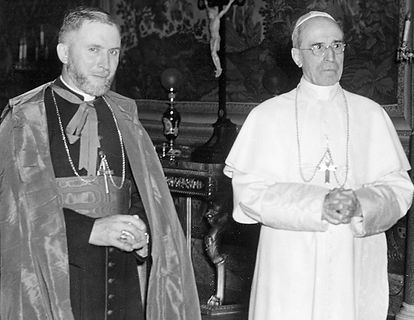Archbishop Lefebvre on the Liturgical Reforms of Pope Pius XII
Pope Benedict XVI stated about Archbishop Lefebvre: “I consider him to be the most important bishop of the 20th century with regard to the universal Church” and called him a “great bishop of the Church.” Thus this prelate continues to be an important voice for our time.

In this vein, we offer in PDF a compilation of statements made by Archbishop Marcel Lefebvre concerning the reforms that comprise the 1962 liturgical books and why they must be accepted based upon the principle of obedience to authority vis-à-vis Catholic doctrine as there is nothing modernist in them. He also explains how these reforms were improvements to the Roman Liturgy.
These statements have been extracted from a series of conferences that were given at St. Thomas Aquinas Seminary in Ridgefield, CT in April 1982 and April 1983.
Some explanations have also been provided to give a historical context to the conferences, demonstrate the significance of these statements, and refute some common rumors and false claims.
A preview of excerpts
Thus, we cannot say always “that is modernist, this is modernist, that is modernist.” Perhaps it was that certain men when in doing this reform of the breviary, in their minds they intended it to be the preparation of a future reform that is modernist. But to say that this reform [published under Pope John XXIII] was modernist, I think that is exaggerated. I do not think it is modernist. We cannot say that it is.
But you know that this reform is not truly of Pope John XXIII. It was done during the pontificate of Pope Pius XII. Myself, I know that because when I was Apostolic Delegate in Dakar, and when I was going to the episcopal conference in Madagascar... in West Africa, etc., for the episcopal conferences, I received a letter from Rome to speak with the bishops in Africa to ask questions about the reform of the breviary, during the pontificate of Pope Pius XII. (...)
What is the first principle to know what we must do in this circumstance, in this crisis in the Church? ...The principle of the Church is the principle of St. Thomas Aquinas. ...So what does St. Thomas Aquinas say about the authority in the Church? When can we refuse something from the authority of the Church? ...“Only when the Faith is in question.” (...)
We must now do an application of the principle. For me I think that the liturgical reform of Pope John XXIII has nothing against the Faith. You can take the Pontificale, the Rituale, the Breviary, the Roman Missal, and... what is in these books of Pope John XXIII that is against the Faith? Nothing! And so: ...I cannot refuse this book, because he is the pope, and the pope gave me this book...
The compilation can be read in it entirety as a PDF.






